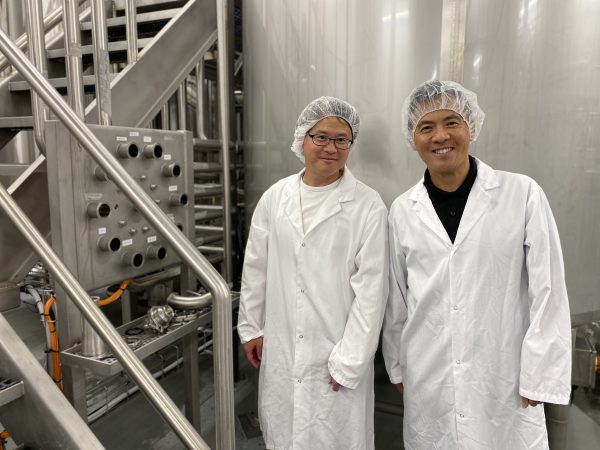
Surge in demand for plant-based foods brings manufacturing challenges
by Francis Lo, Co-founder, Yoso
Manufacturing plants need to meet these consumer demands by preparing great tasting, wholesomely produced plant-based foods.

Brothers Erik and Francis Lo – Co-Founders of Yoso. They recently opened a new $10mm production facility in Cambridge, ON, increasing production capacity by 10x.
Canada’s plant-based food industry continues to grow at a rapid pace. Sales in 2020 were up by 25 percent, making the industry worth more than $600 million annually. But issues around ingredients sourcing and how to deliver a consistent sensory experience and regulatory challenges (intensified by COVID-19), present numerous challenges for those wanting to compete in this increasingly competitive sector.
Plant-based food manufacturers, as in other industries, are seeing an increase in logistical costs for supply chain management and shortages for many food ingredients. Government regulations add to the burden. Successful brands are responding with inspired, innovative thinking to keep them afloat.
Manufacturing plant-based yogurt
The greatest challenge for plant-based food manufacturers is to keep up the speed on new product development, specifically getting tastes and textures right to deliver the same experience as consumers expect whenever they consume the product. Product development is uniquely challenging as they need to compete with the animal product version, which is typically more familiar to the consumer.
Recognizing the need to give Canadians more choice in the plant-based category is the first step. When developing yogurts, it is important to selectively enhance some of the characteristic and desirable flavours originally present in the plant-based extract, such as beany notes from soy, by an appropriate level of tartness during the yogurt-making process.
Once the product composition is down the ingredients need to be sourced, which is another challenge as the plant-based food industry continues to grow – an issue heightened by supply chain constraints from COVID-19. Many companies are seeing a shortage in many food ingredients such as coconut. All of these challenges can test a company’s ability to manufacture a reliably consistent product.
Taking it to the next level
As the plant-based industry grows, so does the output. Manufacturing facilities should be capable of increasing output capacity with production lines equipped with an advanced level of programmable automation for safer production under more precise automatic controls at better efficiency in terms of energy and yield (i.e. the recovery of processed ingredients into packaged products). These equipment features can also allow companies to process field crops into finished products in a more complete way, with less waste.
Investing in manufacturing facilities can help better reflect product development strategies along with a company’s environmental footprint, helping to reduce their draw on resources including natural gas, water and electricity. Companies can also make better use of the waste generated from their manufacturing process of products.
Overcoming regulatory challenges
As plant-based foods gain traction, it puts a spotlight on the need for Canadian regulations to keep pace with its progress and create a level playing field for plant-based alternatives. For example, plant-based chicken nuggets have to be fortified to have a higher level of protein than what is expected of real chicken.
Consumer demand for plant-based foods is here to stay
Consumers have demonstrated year-after-year that plant-based foods are not just a passing trend, and not just for vegans. Canadians want to adopt more plant-based eating habits in part because they understand that plant-based foods can be healthier for the environment, as well as for themselves. Manufacturing plants need to meet these consumer demands by preparing great tasting, wholesomely produced plant-based foods. New advancements in technology and manufacturing equipment allows for the products to reach their ideal textural qualities with fewer food additives. This meets another consumer demand for foods with a shorter, more natural ingredient list.
Where to from here?
As the industry continues to grow, manufacturers are hoping regulations become more consistent and transparent. Companies hope to see a return to normalcy in supply chains even as they continue to combat the pandemic. However, it will always require innovative, creative leadership to drive the industry forward.
Yoso is a family-operated business with a plant-based line of yogurts, dedicated to creating nutritious and wholesome products with a focus on health and sustainability.